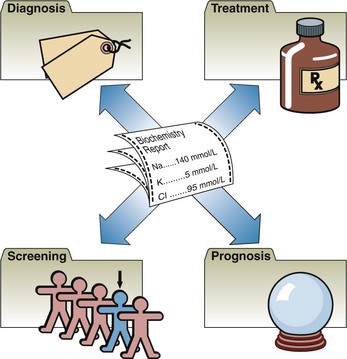1 Clinical biochemistry, chemical pathology and clinical chemistry are all names for the subject of this book, that branch of laboratory medicine in which chemical and biochemical methods are applied to the study of disease (Fig 1.1). While in theory this embraces all non-morphological studies, in practice it is usually, though not exclusively, confined to studies on blood and urine because of the relative ease in obtaining such specimens. Analyses are made on other body fluids, however, such as gastric aspirate and cerebrospinal fluid. Clinical biochemical tests comprise over one-third of all hospital laboratory investigations. Biochemical investigations are involved, to varying degrees, in every branch of clinical medicine. The results of biochemical tests may be of use in diagnosis and in the monitoring of treatment. Biochemical tests may also be of value in screening for disease or in assessing the prognosis once a diagnosis has been made (Fig 1.2). The biochemistry laboratory is often involved in research into the biochemical basis of disease and in clinical trials of new drugs. Biochemical facilities are provided in every hospital, although not necessarily to the same extent. All biochemistry laboratories provide the ‘core analyses’, commonly requested tests that are of value in many patients, on a frequent basis (Table 1.1). The clinician will often request specific groupings of tests, and clinical biochemistry assumes a cryptic language of its own as request forms arrive at laboratory reception for ‘U & Es’ (urea and electrolytes), ‘LFTs’ (liver function tests) or ‘blood gases’.
The clinical biochemistry laboratory
The use of biochemical tests
Core biochemistry
The clinical biochemistry laboratory












